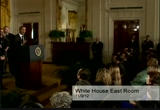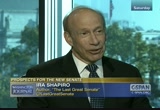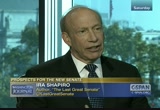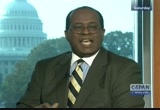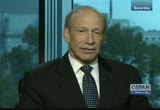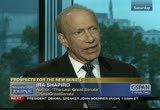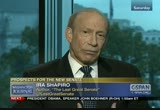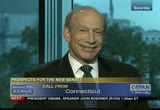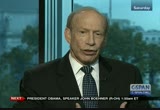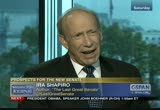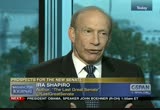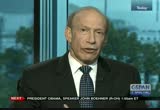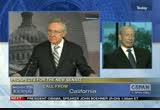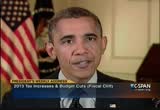tv Public Affairs CSPAN November 11, 2012 1:10am-2:00am EST
1:10 am
>> i remember on the college paper a fellow named josh oh who is a big reporter at politico. he liked to go through the trash of the board and wanted me to come along and the fact there was something you could do for a living that had tiny bit of respect involved diving through people's trash seemed so interesting. but is the dumpster dive over? have the lawyers shut that down? >> there are a lot of lox on dumpsters these days. >> that's too bad. >> thank you for being here tonight and thank the panel and we'll see you the reception. >> next a look at the changes in the u.s. senate following tuesday elections. then the president obama obama and speaker bainer and then the polling during the 2012
1:11 am
presidential campaign. >> tomorrow president obama will be at arlington national cemetery to participate in the ceremony at the tom of the unknown and a remembrance ceremony. live coverage begins at 11:00 a.m. eastern on c-span. >> 2013 should be the year we solve our debt reform. i'm proposing we avert the fiscal cliff and 2013 is finally the year our government comes to grips with the problems that are facing us. >> i'm open to compromise and new ideas. i'm committed to solving our fiscal challenge. but i refuse to accept any approach that isn't balanced. i'm not going to ask students and seniors and middle class
1:12 am
families to pay down the entire deficit while people like me aren't asked to pay a dime more in taxes. >> the new elected congress starts in january but the congress has to do work in a lame duck session and they have to work on the federal deficit raising the debt ceiling and by how much and planned cuts to domestic and military spending also known as sequestration. live coverage on c-span and c-span2. >> now a discussion on the impact of tuesday's election on the u.s. senate.
1:13 am
host: ira shapiro is the author of "the last great senate." he is here to talk to was about the issues facing the senate coming up in the next edition of the senate. welcome to the program. guest: is good to be here. host: tell us a bit about the book. the title, the last great senate. what was it about the folks who were in that senate, the class of '62? who were the big guys in that class and what made them part of the last great senate? guest: i said in the book that america had a great senate from the early 1960's through 1980, a group of people who were focused on the national interests and were in the forefront of every issue facing the country. it is the senate of hubert humphrey, howard baker, robert and ted kennedy, robert dole and many others. they were an unusual group and they were triggered, in my
1:14 am
estimation, by their war experience, the need for dealing with the cold war, and a progressive impulse that focused on some moral imperatives starting with civil rights. what you see is that senate was at the forefront of everything and accomplish an enormous amount over that period of time. host: what is it about the times we live in now makes the operation of the senate different from the way the senate operates during the time you were writing about between 1962 and 1980? guest: i always say it is harder to be a search senator today with the demands of campaign fund-raising -- to be a senator today with the demands of campaign fund-raising and the type of media we have, 24 our media, political conversation on facebook and twitter - 24-hour media, political conversation
1:15 am
on facebook and twitter. those senators focus on national interests. what has gone on during the last 20 years and has worsened on -- during the obama presidency is a hyper-partisan senate. they have become polarized and paralyzed. host: ari shapiro is the author of the last great senate. we will be talking about what the ramifications are, from his perspective, of the senate's our inability to deal with the fiscal cliff. he is a longtime former senate staffer. he will talk about his experience as a senate staffer. if you want to get involved in the conversation, give us a call.
1:16 am
you can also reach us on facebook and e-mail. talk to us about while you got involved in the senate. what were some of the most memorable experiences you had as a senate staffer? guest: i was lucky. i first intern in the senate one day after graduating from college. i got and internships with a liberal republican from york, one of the great senators of all time. i got hooked on the senate and decided to go to law school and came back six years later and was able to work for gaylord nelson and robert byrd. i finished with jay rockefeller as his first chief of
1:17 am
staff. i had many memorable experiences, which are not in the book because the book is not a memoir. it is a narrative history. i had a responsibility for trying to write the senate ethics code, lead the effort to write the senate ethics code. i spilled water all over ed muskie when he was angry at us for taking away his honoraria. i had many experiences there. it was a time when the senate, because of the great people in the senate and the way it operated. it was a magnet for a lot of us coming to washington. wandering the halls, and i did not know them all in the 1970's were madeleine albright, stephen breyer, susan collins, lamar alexander. many of the leaders. and in the media today, chris
1:18 am
matthews, george will. many of these people got their training in the senate. we were not part of the greatest generation. we have the next best thing. we were trained by them. host: our next call for ira shapiro comes from barry. you have to turn down your set. we are getting feedback. caller: i just turned it down. this is why they had more democrats back then, because of the tea party. they made our government stagnant. they are upset about capitalism. that is what built our country.
1:19 am
we send them a strong message. as americans, we need to back up the present by getting more involved with the senate. e-mail in your search senator, your congressman and even the president. -- e-mail your senator, the congressman, and even the president. host: we will leave it there. talk to us a little bit about what barry brought up. it is not up to 55 on the democratic side and 45 on the the republican side. what support are they going to be able to provide for president obama and what he is going to be able to do? guest: it was an extraordinary election. six months ago, it was predicted that the republicans were going to take the senate because the democrats with sending so many seats. the democrats' won 25 of the 33
1:20 am
senate elections. -- the democrats won 25 of the 33 senate elections. they want and all of the country. it is a victory that goes with president obama's victory. it was an affirmation of some good senate democratic candidates, but a rejection of republican extremism and obstruction. i want to emphasize the obstruction. the senate has always been a difficult place to make work. filibusters have always been in the atmosphere and a potential threat. and he is to be that the obstructionists were a few individuals. the leaders used to work to try to make the senate do the nation's business. these last four years, we had obstruction as a strategy of the republican party, led by senator mcconnell.
1:21 am
if this election can be read as a the fsa -- a rejection of the polar ice senate. host: you are on the line with ira shapiro. caller: there were ability presidents i got this country out of trouble from the banks. we got into trouble trying to bring the banks back to their solvency. the greenback got us out of trouble. we have to get the little man out of the picture of the money and let america start controlling its money again and bring it back to the congress. that is my statement. thank you. guest: i think president obama
1:22 am
provided leadership to save the banks. it was necessary to save the banks in order to get the economy going. he then provided leadership for some regulation of the financial institutions through the dodd-frank legislation. we can argue about whether that is adequate regulation. we are going to have a debate still over whether these too data to failed banks are too data to exist and should be broken up -- too big to fail banks are too big to exist. caller: i have two comments. first of all, i see some inclination here to over romanticized what the senate was in the past. one example i think of when you say we did things for the good
1:23 am
of the country was the subsidy we gave to our tobacco farmers. it is disgusting, appalling, and inexcusable. it represented the power of one or two senators or a handful of two -- handful of senators to control things and clearly that was not good for the country. as far as the current congress goes, i am upset with the democrats because they give away things on the 40 votes. they should make the republicans actually filibuster. that means the republicans have to get up there and read from the bible in shakespeare and stuff like that. make them do it. do not just give things away because they have 40 votes. guest: i agree with the caller. we all know the filibuster has been abused in an incredible way in the last few years.
1:24 am
i think it is going to be necessary and important to reform and dramatically changed the filibuster, dramatically changed the use of individual holds by which individuals stop legislation and nominations for any reason or no reason at all. that is not the senate ought to work. that is not the way the country ought to work. i agree with the need to make these changes. i would say, in response to the first point you made, i never claimed that the great senate was perfect. what it was was consequential. it was in the forefront of dealing with the major challenges of the time, from civil rights to vietnam to watergate. every progressive accomplishment, legislatively, in the environmental area, for women, for consumers, had its origins in the senate.
1:25 am
host: in the books, we have this quote. issues were taken on the merit and face no matter how tough they were. nominees were just on their merits. the national interest dictated the result. it was the last great senate and it would not last much longer. first off, why are the politics so partisan? if the men and women who are elected to the senate are coming here because they believe they are doing the work of the people, why does it seem that the politics are so partisan? guest: there is no doubt that the country is more partisan than it was, more divided. i also think the change in the parties are such that there are
1:26 am
not the core of republican moderates that we used to have. southern democrats were more conservative. there is more overlap, without question. there was an easier way to find consensus. that does not excuse the current senate. the current senate has pursued a relentless policy of partisanship, particularly the republican minority since president obama came in. if you go back to 2009, january, we are in the midst of a national economic crisis, on the verge of depression. the president was entitled to think he would get some cooperation from the leaders. that is the way our system works. he got no cooperation. the difference between the leaders that i grew up with, such as howard baker of tennessee and mitch mcconnell of kentucky today is like the grand canyon.
1:27 am
there is simply no comparison. host: was there a particular event that signals the end of what you call the last great senate? guest: there were stages. what i call the great senate of the 1960's and 1970's ended when president reagan was elected. he came in with a lot of republican neophytes and sloughed out a lot of the great senators. -- knocked out a lot of the great senators. the story was not done yet. in the 1980's, the senate came out and functions pretty much like the senate did. in the 1990's, newt gingrich and his senate counterparts took over the congress in 1994. they started straight down. i think the senate has been in
1:28 am
a 20-year decline, which i think is about to end. host: back to the phones for our discussion with ira shapiro, author of the last great senate. from our line for democrats, you are on "washington journal." caller: i am calling because i was glad about the outcome of the election. it is time we do something different. the republicans are saying the american people believed in them and gave them control of the house again. what they fail to realize is if most of the people were up for reelection, most of them would have lost. and the house would have been democratic again. we have to bear that in mind. the house republicans said to the american people what they wanted to hear, we are going to create jobs we and went to help
1:29 am
the country and they had no intention of doing it. if they had an intention of doing it, they would not have taken the vote -- the oath with norquist. guest: i am and active democrats and i -- active democrat and i wear two hats. after the 2010 census, the districts where gerrymandered. it was difficult to defeat house incumbent members. the national mood and the national mandate is reflected by the president's clear victory and the senate blowout across the country. it was in national landslide for the democrats. host: donald sent us an tweet and was to know how we reform the filibuster. guest: there are a number of
1:30 am
ways you can reform it. i would have done it this year. this year, no one knew who was going to be in the majority. it would have been a great time to do it. you should have a special committee look at it and report to the senate rather rapidly. i would focus on getting rid of the filibuster of motions to proceed so you get on to the legislation. i would get rid of holds, which have morphed into indefinite holds where people can tie things up. i would guarantee the president a vote on his nominees for cabinet positions and judicial positions. there is a statistic. from president carter to george w. bush, the president's got their nominees prove -- approved 79 to 99% of the
1:31 am
time. president obama got 43% of the time. if there are any filibusters left, they need to be rare and they need to be need to be actual filibusters. host: one of the nominations that did not get the senate approval was that of robert bork. that is the subject of this tweet. he says, the author is biased against conservative republicans. his beloved senate of the 1980's is the one that castigated robert bork. guest: robert bork was defeated in 1987. he was defeated by democrats and some republicans. he was regarded as the right-wing's preeminent legal scholar. the senate approved double --
1:32 am
approved in the number of nominees to the supreme court, including justice scalia -- justice scalia. bork was regarded as exceptional and he was defeated for that reason. host: it is not that each side is trying to avenge their last defeat so bad when a -- so that when a democratic nominee comes up for approval, they are defeated by republicans and vice versa. guest: there is certainly some of that. sometimes they act like the sharks and the jets in west side story trying to remember who hit first. if you look at the record, what you find is, prior to president obama coming into office, the republicans have nominated 11 of the last 13 supreme court
1:33 am
justices. all of those people were confirmed with the exception of bork. the fact that the republican right wing was not happy with sandra day o'connor or david souter or harry blackmon when they became supreme court justice does not mean they did not get nominated and confirmed. host: back to the foams -- phones. scott is on our line for republicans. you are on the line with ira shapiro, author of the last great senate. caller: i give you credit for saying you are a democratic sympathizers. at the beginning of the program, you did not acknowledge that. it could also tell by the tell of -- title of your book. the last great senate in 1980 when the republicans took over the senate. you mentioned that there has
1:34 am
been obstructionism in the u.s. senate. you seem to forget that in the first two years of the obama administration, the democrats had 60 votes. they could do anything they wanted, anything. how do you reconcile your statement with the numbers in the senate? i will take your answer of the air. thank you. guest: that is a good question and i reconcile it this way. the senate has never worked on a party-line basis. the senate has been the place where the democrats and the republicans have come together to debate and forge principled compromises. the idea that you ram through your program just because you have 60 votes is not the way the senate has worked. in the book, i described one bipartisan accomplishment after another.
1:35 am
walter mondale had a great phrase for the senate. he said it is our national mediator. it is the place where democrats and republicans came together. for the past four years, the republicans have not offered any support for the democratic president. they have not cooperated. when a couple of republicans, susan collins and olympia snowe, supported the stimulus package, they were virtually ostracized within their party. that is not the senate is supposed to work. i am quite convinced that it is not the way the senate will work going forward. host: we have a tweet from laura. she was to know how much of senate this function can be blamed on current leaders harry reid and mitch mcconnell? i think they are terrible, she says. guest: they have been in a senate knife fight for too long.
1:36 am
i think that is a problem. i cannot think the blame falls equally. i think senator mcconnell has pursued a relentless and deliberate strategy of obstruction from day 1. he acknowledged two years ago, three years ago, that his highest priority was to defeat and deny president obama a second term. that is not the way the senate is supposed to work. that is not the way our government is supposed to work. between elections, the government is supposed to do the nation's business. senator mcconnell and the republicans need to consider whether his leadership should continue. host: back to the phones. phyllis in bloomington, indiana. you are on "washington journal." caller: i was born during the depression years when there was
1:37 am
no benefits and the welfare for anyone. i am concerns about the country is going on the welfare system. we now have 60% of our babies being born to single mothers. that is a difficult situation for the mother, the child, and the nation. my stress on the party politics -- i think we should have term limits. pensions should be limited or eliminated. i called the c-span directory. there are years of men and women sitting in the house. in the senate, there are 2500 years of accumulated terms.
1:38 am
you have these men and women just sitting there getting these wonderful benefits and voting in whatever they want so that when they leave the congress, they will be wealthy, most of them. host: thanks, phyllis. guest: i have been speaking about my book around the country and this question of term limits always comes up. it is an important question. based on the experience in the states, particularly california, is that term limits have not been constructive. the california legislature went from being one of the best in the country to one of the worst rapidly. i believe a mix of experience and new people makes the system work better. we have new people coming into the house in recent years. what is really needed is a recreation of the spirit of
1:39 am
compromise, recognizing, as alan simpson said recently, if you don't believe in compromise and you are in politics, you were in the long line of work. host: talk to us about the case of olympia snowe. she wrote an op-ed back in march when she made her announcement that she will no longer be in the senate and talked about why she was leaving and she said some people were surprised by my conclusion yet i have spoken on the floor of the senate for years about the dysfunction and political polarization and the institution. simply put, the senate is not living up to what the founding fathers envisioned. guest: i think senator snowe's statement then was 100% accurate. i have had a chance to talk to senator snowe and i said i was not surprised when you decided to risk -- retired because of your frustration which has verged on discussed. olympia snowe's statement is
1:40 am
very representative of what other senators feel. one reason i have been relatively optimistic compared to everyone else, even before the election, was that the senators were as angry and frustrated about the way the senate was working. my sympathy for them only extends so far. they had not trapped in this hyper-partisan environment. they can change it. they can change their leaders, they can change the rules, and i go back to being senators. lamar alexander left of the leadership very quietly saying he wanted to be free to make the bipartisan agreements that he remembered when he was a senate staff person. he was basically saying that the senate is not working the way it is supposed to work and i am not working the way i am supposed to work. they can change it.
1:41 am
host: back to the funds, on our line for democrats. caller: good morning and thank you very much for cspan. i'm proud uaw member from upstate new york and i think the last great senate was the 88th and 89 congress and it took 67 votes to invoke cloture to break a filibuster. i focus on the civil-rights act and the debate on this of rights act in 1964. it is hard to believe it could happen today but back then you have the majority leader michael lance hill and the minority leader -- leader everett dirksen and they both co-sponsored the bill. dirksen was in the republican party but he stood on principle and said i support the 1964 civil rights act because i am for mankind. i think that was the last greatest senate in the u.s. congress. thank you for your time.
1:42 am
guest: i think that was the greatest single legislative accomplishment in american history. i would also say that dirksen, his leadership, delivered 27 out of 33 republicans in the senate even while the republican party was nominated barry goldwater who was one of the few who was opposed. that was a great accomplishment. what i have said in the book is that that kind of legislation continued in the 1960's and into the 1970's. they did things the same way. it was not as enormous as an accomplishment as the civil rights act but the panama canal treaties or rescuing new york city or a saving chrysler, that was all done on a bipartisan
1:43 am
basis. that is the way the great senate operated. host: the gulf of tonkin resolution was also on a bipartisan basis. guest: it was within a period of weeks after the civil rights act of 1964 that they did the gulf of tonkin resolution. many of them always regretted doing it. the truth is, they decided to give political cover to president johnson during the 1964 campaign. the wanted to stand by the president. they never intended, none of them, intended it to be a blank check to enlarge the vietnam war. they regretted having died and he started using it that way. from 1964 on, the senate was the focal point of the
1:44 am
opposition to the war. democrats opposing it during president johnson's term, republicans joining them as well, president nixon's term, the second moral imperative that these centers dealt with was ending the war. host: can there be a parallel drawn between the actions of the senate in that period and the support of the gulf of tonkin resolution and the support of the congress with george w. bush and moving into the war in iraq? guest: certainly, it is an important question. the thing that i sometimes compare was the first gulf war in 1991 where i think there was very serious congressional debate, very searching debate,
1:45 am
before the first president bush was given approval and authorization as opposed to the second iraq war, the more recent one. i don't think debate was very surging. robert byrd and ted kennedy and carl levin led the opposition to it but for the most part, it was a rush in judgment. host: our line for republicans is next. caller: good morning, good morning -- host: turn your television down. it will help. caller: good morning, i would first like to say that i feel sorry that mitt romney, a man of great moral and president obama had to go through so many difficult during the time of campaigning and they will have set the standard to work on.
1:46 am
i really want to know -- we know this country is divided and when the senators come with an issue, are they informed on both sides well enough to make a decision? one of the things that is coming before us is that tax on the people making the most money. will they have to take a look at that? some say it will work and another side says it will not work. the american people don't know which side will work. guest: i think the senators will be well informed. i think the caller is certainly right about the divisions in the country. i think that's why the restoration of the senate, the senate becoming, again, and
1:47 am
effective institution is important. if the senate was the place where a lot of these things get debated and differences get reconciled, the senators need to rise above the divisions. they cannot just reflect divisions, they need to rise above it and that's where you find the compromises and the right answers after vigorous debate. host: next up is malibu, calif., on airline for independents. caller: thank you very much. i would point out harry reid has refused for the longest time to bring up many things and has basically stopped any progress going forward. the problem is the senate is led like an arrogant country club. if you have a problem and there is a solution and it is a
1:48 am
serious solution, they will have to compromise and you don't solve the problem. it is something that bothers me greatly. in the civil rights act, lyndon johnson needed 110 republicans to pass the civil-rights act. he was opposed vehemently by the democratic party and you failed to mention that. you are being extremely selective. as far as california legislature, willie brown gender -- gerrymandered us with democrats controlling. are broken overspent and overtaxed. our senators are not helping us. guest: i actually don't think i am being that selected. lyndon johnson on the civil rights act, had great support
1:49 am
from the northern democrats and the western democrats. was able to overcome the southern democrats opposition with the help of the republican party. i said that about everett dirksen so i am not really being that selected. i do think my book touches a bark -- upon the origins of the problems we have today, the toxic politics of america started in the late 1970's. one of the problems, very frankly, was the opposite -- was proposition 13 in 1978, the tax revolt that rolled in from california. i think the first basic no-tax pledge, the revolt of 1978, has been greatly responsible for california's decline. host: in the incoming term in the senate, there will be a record number of women, 20
1:50 am
women in all, serving in the senate. your book focuses primarily on men. do you see a shift in the operations or the decorum in the senate with so many women involved? might this be a return of greatness to the senate? guest: i think it can contribute. i've said in my book and in my talks that the only improvement in the senate that i see today as opposed to the one i wrote about was that there are women in its, we got from one woman to up to 17 before this election and now, 20. the women apparently worked extremely well across party lines. i have talked to barbara mikulski and susan collins and olympia snowe and others. they have not been able to change the prevailing mood of the senate.
1:51 am
i am hoping that the addition of several more women but more importantly, the rejection of republican extremism and obstruction and people's genuine anger about the paralysis of the senate -- those things together coupled with the urgency facing us of the fiscal challenges, i think will hopefully change the senate. host: longview, texas, on airline for democrats -- caller: good morning and thank you for taking my call. i would like to talk about the congressional budget and empowerment act of 1974. guest: the congressional budget act which was passed in 1974 was intended to give congress some power back from presidents who had taken a great deal of
1:52 am
it but also it reflected the fact congress was just passing separate appropriations bills and did not really have an overall sense of the budget. the budget act was passed. it has proved to be challenging to administer and, in general, what we need in the senate and in the congress is what senator snowe and senator mikulski and others would refer to as a return to regular order. that is, follow law, have a budget resolution, have appropriation bills done, don't just operate by continuing resolutions. the senate has failed -- congress has failed to produce a preparation bills that as a routine part of making government work. host: our last call comes from richmond, va., on our line for republicans. caller: good morning.
1:53 am
i have been a republican all my life. i think the republicans have shot themselves in the fourth. -- in the foot. john mccain had a real chance of being the president and he was watching the popularity of hillary clinton so he decided to pick a woman. in other words, barack obama would be a footnote in history if john mccain had made the right choices. here comes amid romney. -- mitt romney. he goes to paul ryan who is popular with the tea party. he picked him.
1:54 am
i think a lot of people say that paul ryan is not really capable. i've got a loaded question for you -- does america really respect a black individual to be their leader? guest: it is good to end on a loaded question. let me say first that john mccain, who was a great senator, and who was the original maverick and had an independent image, i think he had a very difficult time running into thousand eight following eight years of george w. bush. it was likely time for a democratic president to win so i think john mccain had a hard assignment.
1:55 am
with respect to the question you asked, i would say that america elected an african-american, barack obama, and after one of the most intense and expensive and bitter campaigns of all time, reelected him. i would say that is a pretty strong statement of respect for him. some people have said to mate there will be a racial vote in this election. i think it is quite likely that the people who voted against barack obama would have voted against a democratic. host: have been talking with i read shapiro, the author of "the last great senate." thank you very much for being on the program today. guest: thank you for the opportunity to come in. opportunity to come in. opportunity to come in. opportunity to come in. opportunity to come in. opportunity to come in. opportunity to come in. opportunity to come in. opportunity to come in. opportunity to come in. opportunity to come in. opportunity to come in. opportunity to come in. opportunity to come in.
1:56 am
opportunity to come in. opportunity to come in. opportunity to come in. opportunity to come in. discuss it is future of the republican party and the counsel on foreign relations has the late eths development in afghanistan and that country's leaks to the reelection of president obama. watch at 7:00 a.m. eastern live on c-span. in his weekly address president obama urges members of congress to come together to finding solutions to creating more jobs and tax cuts before they expimplete speaker of the house john boehner. >> hi everybody on tuesday america went to the polls and the message you sent was clear. you voted for action, not politics as usual. you elected us to focus on your
1:57 am
jobs, not ours. that's why i've invited leaders of both parties to the white house next week so we can build consensus around challenges we can only solve together. i also plan to bring in business and civic leaders from outside washington to get their ideas and input as well. at a time when our economy is recovering from the great recession our top priority has to be jobs and growth. i focused on that throughout the campaign to create jobs here in america and give people access to the education and training those businesses are looking for. it's a plan to keep us on the cutting edge of invasion and clean energy and balance our budget in a clean and responsible way. we face a series of deadlines that require us to make major decisions on how to pay down
1:58 am
our deficit. decisions that will have a huge impact on the future. i worked on cutting a trillion dollars worth of spending. but aze said over and over again we can't cut our way to prosperity. we have to combine spending cults with revenue. and that means asking the wealthiest americans to pay a little more in taxes that's the way we did it when bill clinton was president. all the increed yents of a strong middle class and a strong economy. i've put forward a detailed plan that allows us to make these investments by reducing our deficit by $4 trillion in the next decade. i refuse to accept any aoh 3r0e67 that is not balance abalanced. i will not ask students or
1:59 am
seniors or the middle class to pay down the entire deficit. this was a central question in the election and on tuesday we found out that the majority of americans agree with my aproach, democrats, independents and some republicans. now we need congress to listen. and they should start by making sure taxes don't go up on the 98% of americans making under $250,000 a year starting january 1. we all agree on this, the taxes on middle class families should not go up. they should extend the tax cuts right now. it's a step that would give millions of families and 97% of small businesses the peace of mind that there's no reason to wait. we know there will be differences and disagreements in the months to come. that's part of what makes our political system work. but on tuesday, you said loud and clear that you won't and clear that you won't tolerate dysfunction, or
195 Views
IN COLLECTIONS
CSPAN Television Archive
Television Archive  Television Archive News Search Service
Television Archive News Search Service 
Uploaded by TV Archive on

 Live Music Archive
Live Music Archive Librivox Free Audio
Librivox Free Audio Metropolitan Museum
Metropolitan Museum Cleveland Museum of Art
Cleveland Museum of Art Internet Arcade
Internet Arcade Console Living Room
Console Living Room Books to Borrow
Books to Borrow Open Library
Open Library TV News
TV News Understanding 9/11
Understanding 9/11

